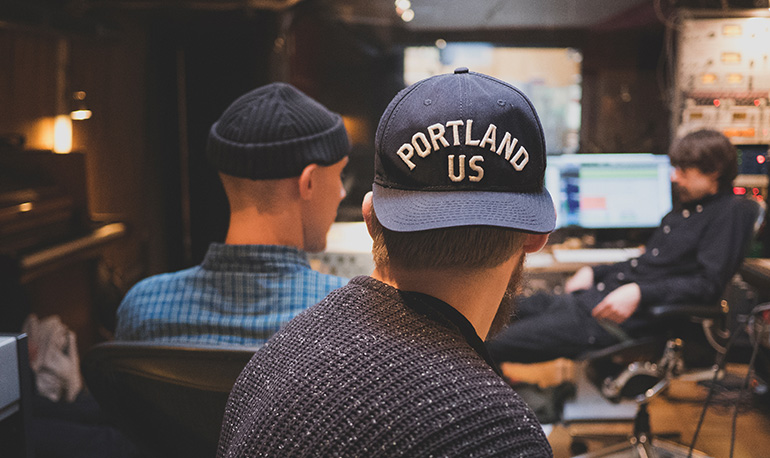Helpful guide to create a more professional sound from your music productions
A few points below to get you thinking about how you produce your music, hope it helps.

1. The Room you are mixing in? If your room/studio has no acoustic treatment (bass trapping or side/ceiling reflection treatment) then your room will affect how your speaker/monitors will sound. Untreated rooms have bare walls which cause many sound reflections. Treating first reflection points will help tame the mids and high-end and you'll have a more defined stereo image. Certain bass frequencies clash and build up, some will null with each other and be reduced. This makes mixing the low-end very tricky.
What can you do? - Pre made acoustic treatment from companies like Auralex or GIK is expensive. Search for 'DIY acoustic treatment' and check forums. You can get the raw materials yourself and make up traps for a much lower price. How to make DIY Bass Traps. The thicker the trap the more bass it can absorb, so you'll need thicker (8 inch) bass traps for the corners of your room and thinner (3 inch) traps for your first point reflection (mix position sides and ceiling) points. Acoustic treatment will smooth out the frequency response of your room, making a much better mixing/listening environment. You also need to think about monitor placement, are they set up in a symmetrical way?, 38% rule, etc, this website covers this - arqen.com/acoustics-101/room-setup-speaker-placement
2. How long have you been mixing your own productions? There is a lot more to mixing than just adjusting levels. The world of audio mixing is huge! The amount of different techniques is mind-boggling. Here's a few - do you understand these fully? Compression (Stereo/mono/Multiband/Sidechain/Bus and stereo bus), EQ (stereo/mono/sides), Adding distortion in a good way, Spatial (Width) (panning), Depth and reverb (pushing sounds back/forward in the mix). Applying automation of volume rides and automation of plugin parameters. Just to get your head around these can take a lot of time, understanding and practice. Don't expect too much too soon.
What can you do? - Again, the internet is your friend here, search YouTube for tutorials and audio forums like Gearslutz.com. Check out Dave Pensado, there are hundreds of 'Into the lair' videos with many mixing techniques explained by the man - www.pensadosplace.tv - You could outsource your production like most of the top artist's teams to a dedicated mix engineer.
3. Monitoring! Are you using near field monitors? Try to get monitors that have the biggest range for low-end. Larger speakers will extend more and be able to reach lower frequencies. This could be detrimental if you go for large monitors in a really small room. This is also all relevant to point 1. which I made earlier in this post. In my opinion investing in a pair of high-end monitors along with acoustically treating your studio is a must.
What can you do? - Push your budget here and get the best monitors you can. Beg, borrow, sell old gear and upgrade to high-end near field monitors. I highly recommend Focal and PSI brands.
4. Recording! Your recordings need to be top notch. You will not match commercial tracks recording vocals with a cheap mic in an echoey room. If you're recording many instruments and vocalists visit a decent local studio. They will have many premium mics for you to choose from and try out. Along with superb pre amps, mic pre's, converters and spaces to record in!
What can you do? - Study your local area for studios - do any studio's suit you? Recording at home, invest in a quality mic and mic pre. In an echoey space think how you could stop this, maybe a portable vocal booth would help.
5. Production! Ignore all the above if your actual production is not up to scratch. Uninspiring sounds, chords, melodies, will just not cut it.
What can you do? - Ask your friends for advice, upload for feedback. Go back to the drawing board if needs be. Hone your craft carefully.
I hope this has got you thinking - and I hope you can implement some of these things to your studio and work flow. Actually, thinking about monitors and the room you're in, there should be a compromise. There is no point spending all your cash on monitors with no acoustic treatment. Like wise, you shouldn't kit out your studio with the best acoustic treatment while keeping your Hi-fi speakers for monitoring.
While you're here have a look around my website, you might find other cool tips. Have you ever thought about using a separate dedicated mixing engineer? Someone with an unbiased ear and someone who hasn't listened to the production in mind many, many times. I can't help with a superb production or recording, but I can help with stellar mixing and mastering. Maybe take the pressure off yourself and let me try, this way you can concentrate on producing.
All the best Clive Knightley
Mixing-Online.co.uk
